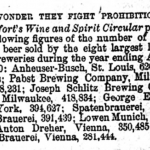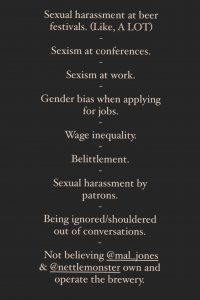 I keep telling myself it will be a short update this week because not much happened but then (i) something happens and/or (ii) I get into my notes and I see that more happened than I thought. That’s the way of the world, folks. Speaking of which, robsterowski guided my eye to the jokey image to the right which is a helpful guide to the clans of beer writers today. Or is it? Sad commentary, that’s what it is. But what do you expect when there’s seltzer scriveners about?
I keep telling myself it will be a short update this week because not much happened but then (i) something happens and/or (ii) I get into my notes and I see that more happened than I thought. That’s the way of the world, folks. Speaking of which, robsterowski guided my eye to the jokey image to the right which is a helpful guide to the clans of beer writers today. Or is it? Sad commentary, that’s what it is. But what do you expect when there’s seltzer scriveners about?
But this is the way it is going for beer these days, not just those writing about beer. It’s all so uninteresting all of a sudden – which, if you think about it, is somewhat interesting. Consider this extraordinary open letter to BrewDog published by Punks with Purpose. There are over 100 named and anonymous co-signers who say they are former BrewDog employees making extremely pointed accusations about the workplace environment:
Put bluntly, the single biggest shared experience of former staff is a residual feeling of fear. Fear to speak out about the atmosphere we were immersed in, and fear of repercussions even after we have left.
What an extraordinary statement about something as banal as a brewing outfit. Who needs to impose a culture of fear to make beer? Update: James, corporate head of the brewery, attempted a response and made it pretty much worse.
You could as easily ask who needs to be a sexist pig to make but but Ruvani de Silva of Craft Beer Amethyst came across another craft brewery with bigotry based branding. WTAF indeed. I used to write posts with titles like “This Is How US Craft Beer Will Kill Itself” on the silly independent beer campaign on 2012 or 2014’s “Yet Another Way Craft Will Kill Itself?” in which we considered the beginnings of craft as gimmick, the foundations of today’s bewildering non-beer beer market. Interesting to see that it may well be the capitalist pigs who kill of craft through simply being found out. Who told you otherwise?
It does seem to be all collapsing slowly, doesn’t it. Former darling NC craft brewery destination of the ticking traveling set and the tourism associations providing the related funding, the venerable Weeping Radish which was established in 1986, has gone up for sale:
North Carolina’s oldest microbrewery, which originally opened its doors in Manteo next to the Christmas Shop, is now located 35 miles north on a 25-acre farm at 6810 Caratoke Highway in Grandy in Currituck County. The sale includes the building, land and the entire business, according to a listing. The asking price is $2.6 million.
No questions about the sale are being answered. That’s a great way to stoke up a market for your properties, isn’t it.
Perhaps (taking in all the above) whistling past the graveyard, Jeff takes on a very apolitical question in this a very political time – the question of the middle market in craft beer:
In many ways, there is no single beer market. I stopped in at Culmination last night and found a brewery thrumming with activity. I had three beers: an expensive hazy, a rum-barrel Baltic (or Polish) Porter, and a Grodziskie. Not a one of those beers could ever enter the middle market. The people at the brewery weren’t there for “normal” beers, either. They wanted a unique local experience. In this sense, craft breweries are like restaurants.
Many questioned the fundamental premise but, me, I think of this as a just happy illusion. Once, I remember a middle aged, middle class radio host saying his favorite thing to do on a summer afternoon was lay upon a lawn chair, have a beer and daydream of former girlfriends. And not for any spicy reason. Just that they never asked in his dreamy mood for him to do any chores. Worrying about the middle class of the beer market is like that these days. We avoid troubles. We have a nap. The actual answer is the middle class of beer sits there before you there on grocery store shelves and in gas station coolers. There is always something moderately interesting at a modest price, isn’t there. Brands may come and go but there’s always something.
Beer has always found a way to make it easy. Further back in time (when things were perhaps similar to today during the Gilded Age of the Capitalist Pig), we learn (as an image posted by Lost Lagers tells us) of 1890 global lager brewing capacity – which is interesting and especially compared to some of the numbers floating around Albany Ale, including Taylor’s Ale brewery in the 1880s having a capacity of 250,000 barrels, at a point in time well past its own heyday. (Note in the comments under that second link, the first time I came into contact with Craig, my partner in crime of over a decade now. Heavens!) Scale.
And certainly relatedly, I had a very good set of chats with Edd Mather this week of the Old Beers and Brewing blog. I was happy to share with him the 1811ish and 1830s era brewing books from Vassar in New York’s Hudson Valley and he immediately went to work unpacking the notes to provide instruction how to clone Vassar’s single ale as brewed on the 13th of August 1833. Excellent stuff.
Another way beer has found a way to find its way was spotted in Afghanistan this week according to The Times of India:
Defence Ministry spokeswoman Christina Routsi said on Monday that a recent decision by the German commander in Afghanistan to ban the consumption of alcohol for security reasons had resulted in a pileup of beer, wine and mixed drinks at Camp Marmal in Mazar-e-Sharif. German soldiers are usually entitled to two cans of beer or equivalent per day. Routsi said the military had found a civilian contractor who will take the alcohol back out of the country ahead of the German troops’ withdrawal from Afghanistan as the NATO mission in the country ends in the coming months.
Note: Calamity Jane drinking at a saloon at Gilt Edge Montana in 1897. Perhaps related, happy to get a Halley Marlor update. You will recall her three months ago brewing this year’s Vintage Ale at Fullers. Now she has started in a new position with Siren Craft Brew. Good luck! Avoid the fear.
Finally, I like this statement which I read this week in relation to some of the horrible news coming out in Canada but it seems to be fairly universal:
Gatekeeping is the way of the white man. Whether it be knowledge, resources, queerness or culture it’s rooted in the colonial and capital imperialistic fallacies of scarcity. That there is a somehow a limited resource and we should obstruct others and assert control and access.
I keep wondering who it was that for so long told us craft was special and how it was related to this sort of gatekeeping. This week, I also heard the acronym WEIRD for the first time: western, educated, industrialized, rich, democratic which also goes a long way and has likely been around a long time and known by others – at least before since I entered my bubble. This is also jangling about my head in relation to brewing… don’t know how but it is.
There. I hope beer gets back to being about beer once day. Meantime, don’t forget to check out those weekly updates from Boak and Bailey mostly every Saturday, plus more with the weekly Beer Ladies Podcast, at the weekly OCBG Podcast on Tuesday and sometimes on a Friday posts at The Fizz as well. There is a monthly sort of round up at The Glass. There is more from the DaftAboutCraft podcast, too. And the Beervana podcast. And sign up for Katie’s weekly newsletter, The Gulp, too. And check out the Atlantic Canada Beer Blog‘s weekly roundup. Plus follow the venerable Full Pint podcast. And Fermentation Radio with Emma Inch. There’s the AfroBeerChick podcast as well! And also look at Brewsround and Cabin Fever. And Ben has his own podcast, Beer and Badword – when he isn’t in hiatus as at the mo, more like timeout for rudeness. And remember BeerEdge, too. Plus a newcomer located by B+B: The Moon Under Water.























